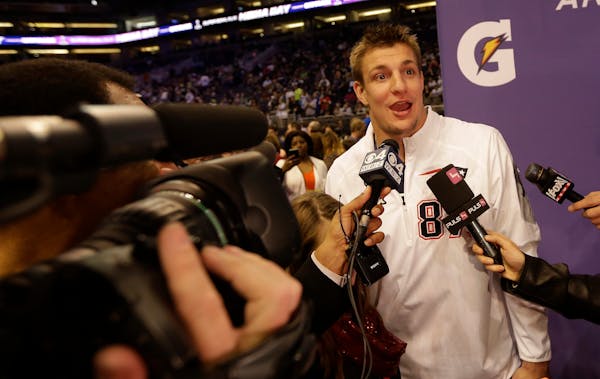Phoenix – The scouts are right. Percy Harvin is unique. He might be the only athlete in the history of professional sports who couldn't get along with Darrell Bevell and Leslie Frazier, who, if they co-starred in a buddy movie, would have to call it "Nice and Nicer."
Harvin didn't like Brad Childress, and helped speed the coach's demise with the Vikings. Harvin threw a weight at Frazier, prompting the Vikings to trade him to Seattle. This season, eight months after helping the Seahawks win a Super Bowl, Harvin was traded to the Jets.
To summarize the Seahawks' dealings with Harvin: They traded too much to get him, rarely saw him on the field, traded him away for too little, and have a chance to win a second consecutive Super Bowl.
Somehow, Seattle's front office wrestled with a porcupine and emerged extolling the virtues of acupuncture. The Seahawks could become the first team in 10 years to win consecutive Super Bowls — one in part because they acquired Harvin, and one in part because they ditched him like a stolen car with personalized license plates.
"We have to do what's best for the organization, first and foremost," said Seahawks General Manager and St. Thomas alum John Schneider. "We had the support of our owner, which was huge. We had discussed it for a long time with our owner. For one reason or another, it didn't work out so we had to move forward."
On March 11, 2013, Vikings General Manager Rick Spielman traded Harvin to Seattle for first, third and seventh-round draft picks. The Seahawks signed Harvin to a six-year contract worth a potential $67 million.
On Oct. 17, 2014, Seattle traded Harvin to the Jets for one conditional draft pick.
That sequence would get 70 percent of NFL general managers fired.
That sequence helped the Seahawks win one Super Bowl and position themselves to win another.
"After the trade, we got back to doing what we do best," Seattle receiver Doug Baldwin said. "Percy is a tremendous talent, and the tendency is to try to force the ball to a guy that talented. Now we're running the offense the way it should be run."
Baldwin noted that the Seahawks don't run the jet sweep now that Harvin has gone, and they don't rely as much on short passes designed to let Harvin run with the ball after the catch.
Instead, the Seahawks rely on Marshawn Lynch between the tackles, Lynch and Russell Wilson's deft use of the read option and long passes to take advantage of defenses massed at the line to stop the run.
In the five games following the trade, Seattle went 3-2. Starting Nov. 23, with a 19-3 victory over Arizona, the Seahawks have won eight in a row.
Seahawks offensive coordinator Darrell Bevell coached Harvin in Minnesota and was in favor of trading for him.
"I think it's always a tough decision, when you're getting rid of that kind of talent," Bevell said. "We know what he can do on the field. It's disappointing, as well. It was disappointing for me. I would have a hard time believing you couldn't thrive in our culture, with the coaches we have here in Seattle, but it wasn't able to work."
Harvin forced the Vikings to trade him, and the Vikings received a handsome portfolio in return. The Seahawks felt forced to trade him, and played better without him.
Harvin wound up playing for the Jets, in a limited offense with little chance to win.
Two teams were glad to get rid of him. That's something close to a trend.
Chinese Grand Prix could deliver drama to F1 and slow Verstappen's victory march

